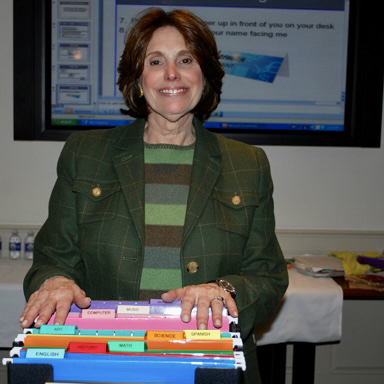The field of organizing behavior has evolved tremendously worldwide over the past three decades. And, having started her business The Organized Student, 32 years ago, educator, writer, consultant, and lecturer Donna Goldberg is certainly at the forefront of her profession.
She started her career as a parent volunteer librarian at Dalton, an East Side private school. After a few years and the experience of having wonderful mentors, she was invited to join the staff. “I loved every minute of it,” she said about the position she held for about 12 years. In particular, she enjoyed her role interacting with children in a safe place where they could read without the pressure of demonstrating academic achievement.
While still a librarian, Goldberg started her organizing business that’s been based at her home at 220 West 93rd Street since 1991. Her eldest child attended Dalton, and early on, Goldberg recognized a need among many students, including her own son, to learn to be organized in order to be able to participate fully and meet the expectations of parents and teachers. Then, the need for learning organization skills was literally brought home when her oldest son’s teacher called to say he hadn’t turned in any assignments in six months. How could this be? Goldberg knew he had been in his room every night doing homework. He also said he had completed all the assignments. It turned out that this was quite true: his backpack was stuffed with long overdue homework. Part of the responsibility for ensuring that students complete and hand in assignments, of course, lies with the teacher.
But, for Goldberg, the most important goal is to help a child learn and internalize the skills to be organized, thereby more productive and self-confident. Starting out, Goldberg worked with the children of friends, not charging for the services as she fine-tuned her training techniques. Over time the business expanded. “I’ve worked with children from almost every public and private school,” she said.
Discussing her approach to teaching students organizing, Goldberg points to three key essentials:
1) Create a filing system to harness all those loose papers so they can efficiently be retrieved when needed.
2) Develop a plan book to record school assignments, recreational and after-school activities.
3) Have a dedicated home study/work location.
In 2005 with a wealth of experience, Goldberg wrote The Organized Student: Teaching Children the Tools for Success in School and Beyond as a manual for parents. She said the book can be read from cover to cover or as the sections apply to certain points of interest or concern. What has evolved more recently and might be the focus of a future project is an exploration of how the emphasis on electronic technology use in schools is detracting from a student’s ability to organize themselves and prioritize activities and manage time. One clear example is that thinking about time as a set of digital numbers gives little clue as to the movement/passage of time in contrast to having an analogue clock where the hands move, allowing the student to see that yes, there are 15 minutes left before the next class and I’ve got that much time to complete what I need to do.
Her mastery of organizing techniques led Goldberg to an unanticipated application of these skills in the management of large complex jobs for adults and a new addition to her business. Recently, a couple who were downsizing and consolidating from multiple residences needed help. The job involves not only real estate management, sorting, and packing but coordinating auctions for fine art and furniture. Undertaking a huge challenge like this and coordinating with client wishes and expectations could be daunting, but not for Goldberg, who knows organizing skills are transferable to every aspect of life.

 By
By